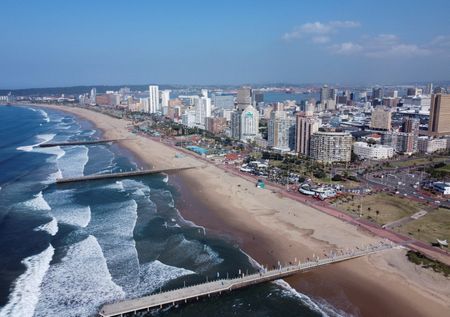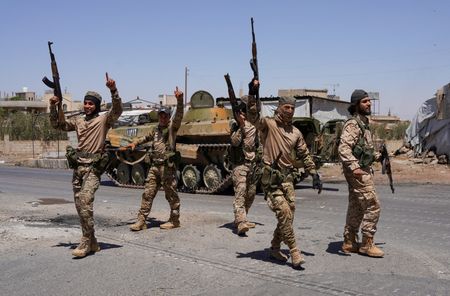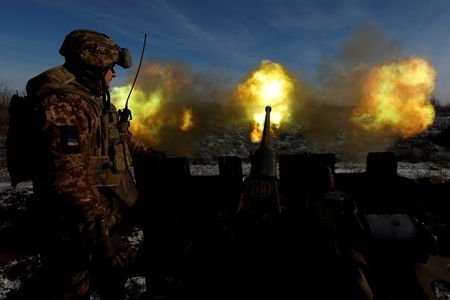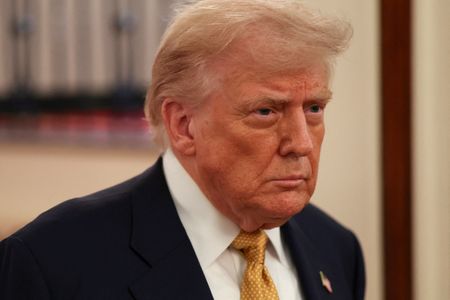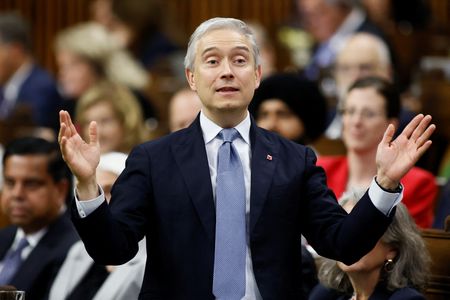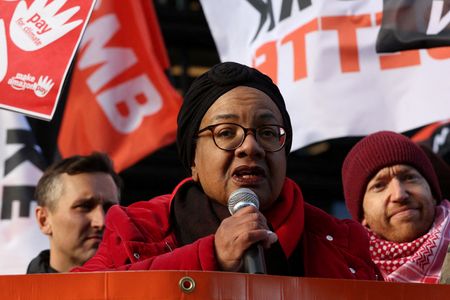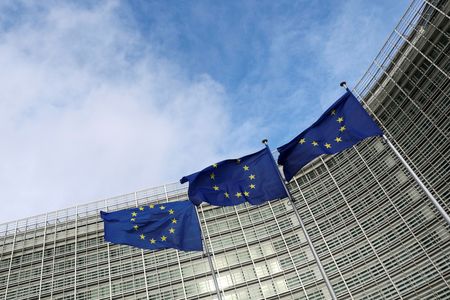By Kopano Gumbi, Maria Martinez and Colleen Goko
DURBAN (Reuters) -South Africa urged G20 countries to show global and cooperative leadership to tackle challenges including rising trade barriers, as the club’s finance chiefs met on Thursday under the shadow of President Donald Trump’s tariff threats.
The G20, which emerged as a forum for cooperation to combat the 2008 global financial crisis, has for years been hobbled by disputes among key players that have been exacerbated by Russia’s war in Ukraine and Western sanctions on Moscow.
Host South Africa, under its presidency’s motto “Solidarity, Equality, Sustainability”, has aimed to promote an African agenda, with topics including the high cost of capital and funding for climate change action.
In opening remarks, South Africa’s Finance Minister Enoch Godongwana said the G20 must provide strategic global leadership, cooperation and action in the face of complex challenges.
“We have a critical role to play in revitalising and strengthening multilateralism by fostering inclusive dialogue, reinforcing rules-based cooperation and driving collective action in global challenges that no country can solve alone,” he said.
“The need for bold cooperative leadership has never been greater.”
Questions, however, are lingering over the ability of the finance chiefs and central bankers meeting in the coastal city of Durban to tackle those issues and others together. The G20 aims to coordinate policies, but its agreements are non-binding.
U.S. Treasury Secretary Scott Bessent will not attend the two-day meeting, his second absence from a G20 event in South Africa this year.
Bessent also skipped February’s Cape Town gathering, where several officials from China, Japan and Canada were also absent, even though Washington is due to assume the G20 rotating presidency at the end of the year.
Michael Kaplan, acting undersecretary for international affairs, will represent the United States at the meetings.
A G20 delegate, who asked not to be named, said Bessent’s absence was not ideal but that the U.S. was engaging in discussions on trade, the global economy and climate language.
Finance ministers from India, France and Russia are also set to miss the Durban meeting.
South Africa’s central bank governor Lesetja Kganyago said that representation was what mattered most.
“What matters is, is there somebody with a mandate sitting behind the flag and are all countries represented with somebody sitting behind the flag?” Kganyago told Reuters.
U.S. officials have said little publicly about their plans for the presidency next year, but one source familiar with them said Washington would reduce the number of non-financial working groups and streamline the summit schedule.
TARIFF SHADOW
Trump’s tariff policies have torn up the global trade rule book and clouded the economic outlook. With baseline levies of 10% on all U.S. imports and targeted rates as high as 50% on steel and aluminium, 25% on autos and potential levies on pharmaceuticals, extra tariffs on more than 20 countries are slated to take effect on August 1.
His threat to impose further 10% tariffs on BRICS nations — of which eight are G20 members — has raised fears of fragmentation within global forums.
Germany’s Bundesbank chief said the central bank’s expectation of 0.7% growth in Europe’s largest economy next year could be eaten up if tariffs of 30% threatened by Trump were implemented.
“If tariffs materialise in August, a recession in Germany in 2025 cannot be ruled out,” Joachim Nagel told Reuters in Durban.
Trump’s attacks on U.S. Federal Reserve Chair Jerome Powell was causing concern too in Durban, with Nagel warning against interfering with the independence of central banks.
On the broader agenda, South Africa’s Treasury Director General Duncan Pieterse said the G20 hoped to issue the first communique under the South African G20 presidency by the end of the meetings.
The G20 was last able to collectively issue a communique a year ago.
(Reporting by Olivia Kumwenda-Mtambo, Kopano Gumbi, Colleen Goko, Philip Blenkinsop, Maria Martinez in Durban, Andrea Shalal in Washington; Writing by Olivia Kumwenda-Mtambo and Emelia Sithole-Matarise; Editing by Philippa Fletcher and Joe Bavier)

